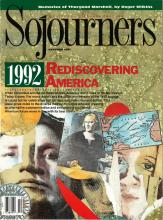In January, a synod bishop of the Evangelical Lutheran Church of America resigned amid allegations of sexual misconduct in a case that has shocked the denomination.
He is the most prominent ELCA pastor to face public allegations regarding inappropriate sexual conduct by clergy, according to The Lutheran magazine, which published a special report on clergy sexual abuse in its July 17 edition. But the case is just one of many involving similar allegations against clergy in the denomination.
The problem of clergy sexual misconduct is by no means confined to one denomination. A study released by the Park Ridge Center for the Study of Health, Faith, and Ethics in Chicago last year found that one in 10 U.S. clergy has had an affair with a parishioner. And last summer, The Los Angeles Times reported that 2,000 cases of clergy sexual abuse were pending in the nation's courts.
Most denominations have been slow to confront the reality of clergy sexual abuse in their churches. However, if measures passed at church conventions this past summer are any indication, that may be changing.
The Presbyterians adopted a strict policy that prohibits sexual contact between clergy and parishioners or church employees, whatever the circumstance. And they are also urging congregations to set up "sexual misconduct response teams" in order to investigate complaints quickly and notify the appropriate authorities when necessary.
Other denominations are just at the point of officially recognizing the problem and taking first steps toward addressing it. Calling clergy sexual exploitation and harassment "abuses of trust" and a "violation of the baptismal covenant," the Episcopal Church created a committee to study the problem and propose standards of conduct and policy procedures in such cases at the denomination's next general convention in 1994.
Read the Full Article
